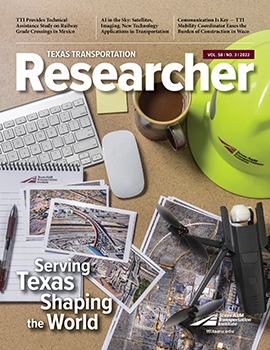
It was Tip O’Neill, a former speaker of the U.S. House of Representatives, who was famously known to say in the 1980s, “All politics is local.”
Countless candidates for office decades later routinely rely upon door knocking and town hall gatherings, attesting to both the durability and relevance of O’Neill’s philosophy. His words concisely captured how it is the mundane but often indispensable elements of everyday life that matter most to people. And few things are more indispensable than how we get ourselves and the things we need from point A to point B. For the most part, we’re far more concerned with the reliability of our daily commute than we are with lofty concepts of a high-speed rail line connecting Los Angeles to New York.
It’s that focus on local mobility issues, often at their most granular level, that inspires and guides the efforts of the Texas A&M Transportation Institute’s (TTI’s) network of urban area offices.
The work in those regions is responsive to the needs of local travelers and their communities, addressing distinct challenges and refining approaches that may benefit other urban areas with comparable circumstances.
Depending on the city in question, that could mean:
- assessing the congestion-relief value of peak-hour lanes on highway shoulders;
- developing new data visualization tools to convey highly sophisticated mobility conditions and facilitate planning efforts;
- creating a web-based tool to visualize and analyze the operational impact of incidents such as crashes, lane closures and stalled vehicles;
- navigating the one-of-a-kind quandaries that are commonplace when city, state and international borders converge;
- using data from connected vehicles to improve traffic signal operation and give priority status to emergency vehicles;
- addressing higher-than-normal incidents of wrong-way driving on freeway ramps; and
- balancing the needs and priorities of community interests in the midst of the biggest highway reconstruction project in Texas history.
You can read more about each of these ventures in this issue of our magazine. You can also learn about the people behind them who constitute our urban office staffs. One and all, they are consummate professionals, highly regarded ambassadors in their communities who hold positions of trust and confidence as they partner with operating agency staff. Although TTI operates as a hub-and-spoke organization, our local experts are nimble and responsive to exclusive local challenges.
Like politics, all transportation is local. Few things tie communities together more practically or profoundly than their mobility systems, and no two of them are exactly alike. Those realities will always be at the foundation of the work we do through TTI’s regional service centers.

